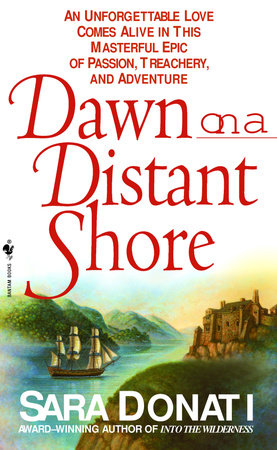Excerpt
Queen of Swords
Chapter One
L'Ile de Lamantins
French Antilles
August 1814
The island, beautiful and treacherous, drew in the love-struck and rewarded them with razor-sharp coral reefs, murderous breakwaters, and cliffs that no man sane man would attempt.
Kit Wyndham was sane. Out of his depth, perhaps, but Major Christian Pelham Wyndham of the King's Rangers was in command of all his senses, while Luke Scott was not.
"Major?"
The lieutenant hovered like a maiden aunt, stopping just short of wringing his hands. If given permission to speak, Hodge would say out loud what he had said too many times already: that they had no business here; that what Scott intended was madness.
Hodge was wrong about one thing: They did have business here, and crucial business at that. The only kind of business that could have forged this strange alliance between himself and the Scotts: They were after the same prey.
A fat moon hung in a clear night sky, sending the shadows of masts and rigging out to dance on the water. On the rail his own hands were drained of color, corpse gray.
He turned to assure his lieutenant that he would have no part in this night's insanity. Let Scott take his band of mercenaries and storm Priest's Town, and good luck to them one and all. Kit Wyndham had made a promise, and he would keep it: Now that their quarry was in sight, he would step back and let Scott lead.
Just behind Lieutenant Hodge stood Hannah Scott, dressed in men's breeches and a leather jerkin over a rough shirt, her person hung about with weapons: a rifle on her back, pistols, a knife in a beaded sheath on a broad belt. She could heal or kill; he had seen her conjure miracles and blasphemies with equal ease. No mortal woman, he had called her to her face, and she had not corrected him with words.
The moonlight was kind to her, as the sun was kind. In the year since they had made their uneasy alliance he had seen her every day, and still the sight of her was startling. By the standards of Wyndham's own kind, Luke Scott's Mohawk half sister could not be called beautiful. Her skin was too dark, her hair too black, her mouth too generous for pale English blood. Below deep-set eyes the bosses of her cheeks cast shadows. Most damning of all, the expression in those eyes was far and away too intelligent. If her skin were as pale as cream, her mind would have isolated her; Englishmen did not know what to do with such a woman.
Even at this moment she knew exactly what he was thinking, the excuses he had been ready to offer, the rationalizations. If he voiced them she would simply tilt her head and look at him. She would call him no names, but he would hear them anyway.
"Major?" Lieutenant Hodge's voice rose and wavered.
He said, "Fetch my weapons." And: "Miss Scott, please tell your brother I will be joining the rescue party."
All this, for a woman.
The men liked to speculate, when Luke Scott was out of their hearing, how much money had been spent on this year long crusade, by the woman's kinfolk and the Crown. Scott wanted his wife back; none of the men doubted that for a minute. He wasn't the kind of man who would let himself be robbed, not Luke Scott. But it seemed that there was more at stake, something nobody was talking about. The fact that Wyndham had been sent after Degre at the same time made that clear.
No expense had been spared. First there was the Isis, the great merchantman sitting idle in the waters off Kingston. She was too clumsy a ship for the kind of work they had to do in the islands, and so Scott had purchased the schooner Patience as thoughtlessly as another man might put down coin for bread and ale. The crew was well paid and the provisions—meat and biscuit and ale and rum—were generous. Beyond the material things, the Earl of Carryck and the Scotts had put down a fortune in pursuit of information.
Kit Wyndham stood back and watched the Scotts contrive. Their money was of less interest to him; he was born to wealth and had been raised among people who knew how to spend it. His family had been cultivating those skills for generations; his mother and sisters were experts. When Scott spent money he bought results. Fast ships, good men, names whispered in dark corners, maps drawn with a bit of charcoal on a tabletop.
Scott's men were expert soldiers, utterly silent, ruthless to a fault, loyal unto death. Part of that was generosity with coin, but not the biggest part. Kit had known men like these when he was in Spain under Wellington.
Now was not the time to think of Spain. He put those images out of his head and concentrated on the back of the man in front of him, called Dieppe. Scott's most important find: a small, quick, wiry man, his skin the deep true black of the enslaved African.
Just last month Scott had found Dieppe in St. Croix and bought him for more than he was worth. Then he offered the African his freedom in return for one night's work. It was Dieppe who knew the reefs that built a fortress around this island. Without him they would need an army to take it, and no doubt the lady would die before they could get to her.
Night birds called, and their voices echoed off the water as the longboat wound its way through a swamp crowded by an army of mangrove trees. A sinuous tail as broad around as a man's waist flicked in the moonlight, and Wyndham touched the long knife at his side. He had seen an alligator twenty feet long rip the leg off a man with a jerk of his head.
Dieppe led them onto land so saturated with water that to stand still was to invite disaster. They followed one by one: Scott, his sister, then the others made a long coiling snake with Dieppe as the head. Dieppe and Scott and some of the other men carried machetes; Wyndham had his short sword.
For two hours they walked through the damp heat of the swamp in the wake of the swinging blades. Tiny gnats gathered at nostrils and the corners of lips and eyes, and Wyndham wiped them away with the back of his hand, thinking of the ointment he had been offered and turned down.
The lagoons, then, as they had been told: long commas of water silvered by the moonlight. The men broke into a trot until they came to the edge of the forest, where they stopped for five minutes while Dieppe and Scott spoke, heads bent together.
The swamps were bad, but these forests were worse. Wyndham concentrated on putting one foot in front of the other and not losing sight of the man in front of him. Something screamed, and the hairs on the back of his neck rose. This dark and fragrant place could hardly be more different from Spain's hot exposed plains and rocky hills, but his blood pounded here as it had there, and would spill the same bright color.
When they came out of the forest Wyndham touched his pistols and his sword lightly, and looking up, caught Hannah Scott's gaze on him. He had seen her kill, but she knew nothing of him in the field, except the stories told behind his back. Most of them were perfectly true.
The cove was small, well protected from the winds, and unguarded. Looking down on it they saw two ships–Degre's
Grasshopper, and another unknown to them. If Scott had sailed the Patience into the cove and tried to walk up the path that had been cut into the cliff face, then perhaps one of the men sleeping with an empty bottle cradled between his legs might have woke to sound the alarm. As it was, they died quietly.
Scott sent half the men to deal with the ships, and the rest of them went into the settlement called Priest's Town. It turned out to be nothing more than a warren of shacks set up off the ground, most of them empty. Two old mulatto women lived in the smallest of them with their goats and swine. They seemed neither surprised to be roused by strange soldiers in the middle of the night, nor worried about their lives. That was another talent of Scott's: he could dispense calm as easily as coin. People trusted him, even when they should not. He could be kind, if it furthered his cause; but ruthlessness came to him just as easily. He would have gone far in the army.
The raiders turned their attention to the largest of the shacks. Directly in the middle, the largest room's outer wall was made of a series of doors, all open to the weather. A rail hung from the sagging porch like a broken arm. Lanterns swayed from blackened posts, some of them dead, others guttering and spewing black smoke. The inside of the house was crowded.
Scott's men moved like a company who had fought together in a dozen campaigns, silently, easily, joined by invisible threads just tense enough to keep them aware of each other. Kit tested the weight of his rifle, as familiar to him as any part of his body. The bayonet clicked into place. It caught what light there was and winked at him.
They waited for the guide, ten minutes, twenty, and then Dieppe came back, sweat covered, trembling. Scott asked him a question in rapid French, and got a nod in answer.
"A child? Did you see an infant?"
"
Non." Sure of himself, of what he hadn't seen.
For the first time tonight, Wyndham saw Scott hesitate. No doubt he had been hoping to find the woman and her child together. If there was a child.
Again he felt Hannah Scott's gaze on him, as if she were reading his thoughts, and answering them.
It was an argument they had had too many times: whether or not the information they had about the woman's condition was to be trusted. Scott believed it was true; Wyndham was doubtful. The old woman who had told them that the lady they were after was heavy with child might simply have been looking for more coin.
In a few minutes they would know. Scott sent some of the men around to the back, and gave them orders to wait for his signal.
Wyndham saw the room for a split second before the battle started. Tables cluttered with dice and cards and cups, a long bar on the far wall, and men who had been enjoying themselves. A dozen of them, dirtier and rougher than many, but still just men burned by sun and wind and erratic fortune.
The one man who concerned them most sat at a large table in the corner, his dark head thrown back in laughter. It had been more than a year since Wyndham had last seen the false priest, but he recognized Degre. And on the other side of the room, sitting behind a small table with cards laid out before her, the woman. She was much changed, thinner and drawn and her eyes shadowed, burning with fever, or anger long held in check. Her belly was flat. If she had been with child, she was no longer.
It took less than a second to see all that, and then his rifle found its target and things happened very fast, and all at once.
There were very few things that Jennet Huntar could be sure of, but one of them was this: For as long as she lived, she would dream of palm trees. Spindle-fingered against topaz skies or storm clouds, dancing against bloody sunsets and bloodier sunrises, always beckoning: They would be with her forever. Right now she could look up and see them against the sky as the night leached away, if she just lifted her head.
But she was at work, and it was the work that kept her wits intact. She had a little table of her own, and two stools. On the table she dealt out her cards for anyone who could pay the price.
When there were few men interested in the cards she laid them out for herself.
The Hangman. The Tower. The Knave of Swords.
Tonight her steadiest, most devoted customer was drinking at the bar. He was called Moore, one of Thibodoux's men off the Badger. When the old Irishman was here, he spent half his coin on drink, and the other half he gave to hear her read him the cards. The other men spent money on the women in the back rooms, but Moore was content to sit and look at what he could not have.
Tonight he waited until the moon had set and he was so full of liquor that he would fall off his chair if Jennet leaned forward to prod him with one finger. And yet he was not so drunk that he forgot what he wanted from her.
He sat with filthy fingers laced into his long, tobacco-stained beard. The low forehead was remarkable for its deep reddish color, set off by a thick twisting white scar in the shape of a cross. His mouth made a perfectly round circle in the middle of his beard, and his tongue flickered when he talked, snakelike.
Tell me, Lady Jennet, when will I get me a good wife?"
It was the question he always asked.
Moore was no better and no worse than the other men who drifted through this place. Always hungry: for drink and release and excitement, for sleep, and beyond all those things, for advantage. Hungry and not particularly worried about how he came by what he needed.
"Not tonight, Mr. Moore. But perhaps sometime soon. Let us look."
She took her time. Moore would not complain. It was mostly what he was paying for, the right to sit close enough to imagine the texture of the skin he could not see, would never see. She was the daughter and sister of an earl; surely her skin must be as soft and white as milk. Many of the men who came here would have delighted to quench their curiosity by taking her apart like a crab, cracking open what she tried to hold back. But she was Degre's pet creature, and they must keep their distance unless it was to sit across a table and hand over coin.
As long as he came no closer and kept his hands to himself, Jennet was content to take Moore's money, and sometimes, when he had drunk enough, the one thing she really wanted from him.









